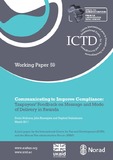Communicating to Improve Compliance: Taxpayers’ Feedback on Message and Mode of Delivery in Rwanda

Download
Date
2017-03-23Author
Mukama, Dennis
Karangwa, John
Hakizimana, Naphtal
Metadata
Show full item recordImpact
Abstract
The journey from coercion to persuasion to drive tax compliance started gradually for the Rwanda Revenue Authority (RRA). This is shown in the mission and core value statements that underpin the tax administration’s activities in service delivery and trade facilitation. Recently the RRA has undertaken aggressive tax education and sensitisation campaigns in order to influence taxpayer behaviour towards more voluntary compliance, having limited resources to undertake enforcement. In the absence of any significant impact evaluation, however, it is hard to determine the effect of these endeavours on the intended outcome of voluntary compliance.
The tax administration had the opportunity to review the effectiveness of its communication strategy through a tax compliance experiment, which involved delivering various messages using different means and evaluating taxpayer behaviour. Although many taxpayers reacted positively to these messages, particularly through upward revisions to their tax returns, there were a significant number whose reactions were not captured – necessitating a further study to investigate why these taxpayers had not reacted in any way. This paper reveals some interesting findings from this study, including the need to remind taxpayers more frequently, and to provide additional information on top of reminders. The paper also shows that taxpayers prefer to receive information on usage of public funds instead of threatening messages (deterrent), which is consistent with the findings of the tax compliance experiment.
Citation
Mukama, D., Karangwa, J. and Hakizimana, N. (2017), Communicating to Improve Compliance: Taxpayers’ Feedback on Message and Mode of Delivery in Rwanda, ICTD Working Paper 59. Brighton: IDS.Is part of series
ICTD Working Paper;59Rights holder
IDSRights details
http://creativecommons.org/licenses/by-nc/4.0/Collections
Except where otherwise noted, this item's license is described as this is an Open Access paper distributed under the terms of the Creative Commons Attribution Non Commercial 4.0
International license, which permits downloading and sharing provided the original authors and source are credited – but the
work is not used for commercial purposes.

